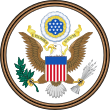When to date the start of the history of the United States is debated among historians. Older textbooks start with the arrival of Christopher Columbus
in 1492 and emphasize the European background, or they start in 1600
and emphasize the American frontier. In recent decades American schools
and universities typically have shifted back in time to include more on
the colonial period and much more on the prehistory of the Native peoples.

Indigenous peoples lived in what is now the United States for thousands of years and developed complex cultures before European colonists began to arrive, mostly from England, after 1600. The Spanish had small settlements in Florida and the Southwest, and the French along the Mississippi River and the Gulf Coast. By the 1770s, thirteen British colonies
contained two and a half million people along the Atlantic coast east
of the Appalachian Mountains. In the 1760s the British government
imposed a series of new taxes while rejecting the American argument that
any new taxes had to be approved by the people. Tax resistance,
especially the Boston Tea Party (1774), led to punitive laws (the Intolerable Acts)
by Parliament designed to end self-government in Massachusetts.
American Patriots (as they were called at the time as a term of
ridicule) adhered to a political ideology called republicanism that emphasized civic duty, virtue, and opposition to corruption, fancy luxuries and aristocracy.
Part of a series on the
|
|---|
History of the
United States |
|---|
 |
| Timeline |
|---|
- Prehistory
- Pre-Colonial
- Colonial period
- 1776–1789
- 1789–1849
- 1849–1865
- 1865–1918
- 1918–1945
- 1945–1964
- 1964–1980
- 1980–1991
- 1991–present
|
|
|
|
|
 United States portal United States portal |


 RSS Feed
RSS Feed Twitter
Twitter




 10:02 PM
10:02 PM
 Unknown
Unknown





















